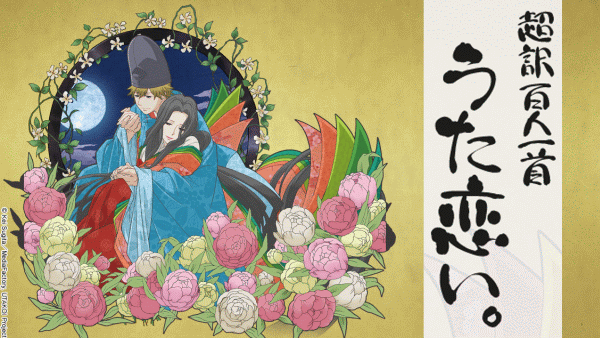Uta Koi
Summary: The Hyakunin Isshu are a collection of 100 poems chosen by Fujiwara Teika to decorate the walls of a relative's mansion and are taken from across Japanese history and from a range of subjects, although as Teika will admit many of them are love poems. So what are the stories behind all of these poems and what do their often highly symbolic words mean?
The Good: I was wondering how well the show would wrap up especially since it's first "arc" wrapped up well and was pleasantly surprised to see how well it went. I actually hadn't know that Teika was also a poet (reading The Pillow Book however I think I've come across several of his relatives/ancestors, all of whom have had some skill in poetry) and that seemed like a good way to end the show, I doubt it was popular enough to get a second season. I also liked how in the first "arc" a lot of the characters knew each other and interacted with each other over multiple episodes, it's hard to do character development in just one episode so this felt like a smart choice. And all of the episodes did a good job explaining where the various poems came from, normally this kind of literary interpretation isn't my strong point but by the end of each episode I could see what the writers (the anime or original poets, I suspect most of the stuff in this show was made up) were getting at.
The Bad: While Teika's appearance at the beginning of some of the episodes was useful (like when he talked about why he chose some poets over others, I'm curious how much of this, if anything, was taken from writings he may have done or if the writers here were just throwing ideas out there) but some times it really didn't, see the episode where he and another character started off the episode by doing ballet while singing in deep voices, in my opinion that was the weirdest moment of the show but there were a lot of other contenders for that dubious award. Actually, there is a lot of random strangeness (and not all from Teika!) in this show and a lot of times it felt rather out of place and it would keep me from recommending this show to fans of Japanese culture but not so much anime. If it hadn't had those bits sure, I would feel fine recommending this to someone who doesn't like anime as much but loves the culture, with it however I don't think I will and considering how small the potential audience for this show is to start with that's not a good thing.
The Audio: This show had a weird opening and closing theme. The opening theme is really nasally (it grew on me after a bit but I think I'm in the minority there) and the closing theme didn't seem to have much to do with the show and I really couldn't stand it. The voice acting seemed alright, no characters really stood out to me but most of the time everything sounded at least passable.
The Visuals: This show was cheap, while some aspects of it you could argue were more stylistic choices than money saving measures (such as the "unmoving plaid" textures) it had a lot of talking heads, slow pans over still images, and just generally didn't look as fluid as say a show with a huge budget. It's okay, I never expected really great art for this show, although nearly any show could be improved with a great budget, but it might be a turn off to some.
So, if you really can't wait until January for Chihayafuru and need something to tide you over, go burn a few hours watching this, the first episode even revolves around the "chihayafuru" poem. If not, well, there are simply so many other shows out there that are better that it's hard to recommend this one, but if you do have an interest in Japanese poetry check it out, don't worry about skipping through the Teika stuff at the beginning of each episode. I give the show a 2.5 or 3 out of 5 stars and, while unlicensed in the US, the show can be viewed over on Crunchyroll.
